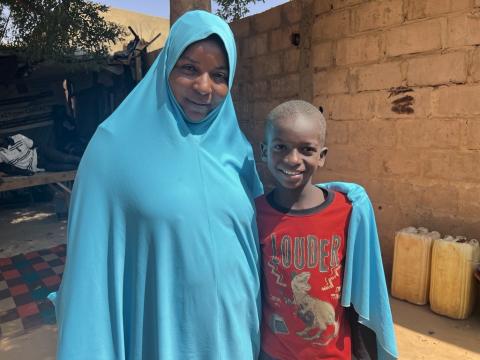In Niger, parents equipped to take better care of their children despite their disabilities

Fifteen percent of the world’s population has some form of disability. Nearly 240 million of them are children, according to the United Nations Special Representative of the Secretary-General on Violence against Children.
The report goes on to say that children and young people with disabilities are three times more likely to experience physical and sexual violence and neglect than other children.
In Niger and around the world, World Vision works with parents through Celebrating Families to give them the tools they need to care for these precious children.
It worked for Rahanatou Souley, mother of three. “My first son, Alhassane, was born deaf and mute,” says the 34-year-old. “Despite his disability, Alhassane is very intelligent. He even attends the local Koranic school. When he was 7 years old, I had enrolled him in the school for the deaf. He goes to school and comes back byhimself. He is one of the best students.”
And yet, Alhassane’s disability frustrated Rahanatou and her husband. “Before the training, if Alhassane made the slightest mistake, we would start hitting him, brutalising him," she says. "Sometimes, when we were frustrated, we insulted him, cursed him and even kicked him out of the house."
To help improve relationships between parents and children with disabilities, World Vision Niger organised a training for 20 parents of deaf and mute children from the Hassane School Bana. The training was carried out in partnership with the Seventh-day Adventist Mission, aimed to help them take better care of their children despite their disabilities.
“The training taught me to accept my child as he is, to support him more, to listen to him and to be more available to him. Thanks to this training, I understood that I should not reject my child despite everything that is happening,” says Rahanatou.
The training was also an opportunity to reframe men's conception of their relationship with their wives and children.
“ Men have to take time to talk and chat with their wives,” explains Rahanatou. “This training made me understand that communication with women creates the harmony and love that children need at home.”
It worked. “After the training, things started to change in my household,” she says.”Previously, my son used to get on my nerves very easily. Now, I look at him with love and compassion. I take more time to listen to [him.] Our relationship has improved a lot.”
Rahanatou’s relationship with her husband's also changed as well, thanks to Celebrating Families training.
“Everything has also changed for the better with my husband. I gave him a gift of a heart that I had made for him during the training. He was very happy,” says Rahanatou.
Highly appreciated by all the participants, the training now serves as a springboard for reunions between them to continue to interact and initiate activities to improve the family environment and the well-being of all family members.
“World Vision has many methods and pedagogies for teaching children. I really liked their approach. It honours and respects everyone. Currently, among us training participants, we are exchanging our experiences in our homes. My husband has accepted the training advice very well. His attitude towards Alhassane and the other children has really changed. He encouraged me to continue attending in these trainings. I am very grateful to World Vision for the knowledge we have gained," she says.
Source:
https://violenceagainstchildren.un.org/content/children-disabilities